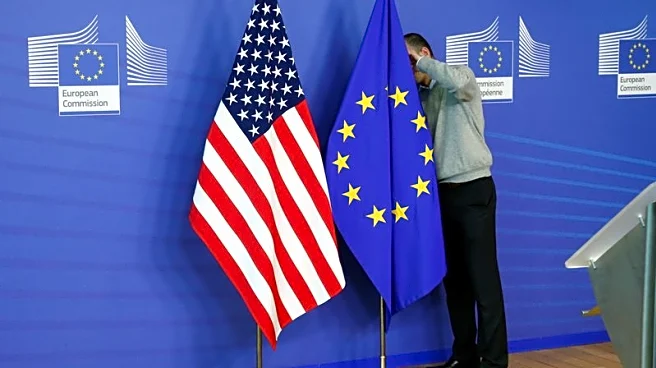What is the story about?
What's Happening?
The U.S. Customs and Border Protection (CBP) has permanently ended the low-value package tariff exemption, which previously allowed packages valued under $800 to enter the United States duty-free. This change means that all imported goods, regardless of their value, are now subject to tariffs ranging from 10% to 50%, depending on the country of origin. The new tariffs could also include a flat fee of $80 to $200 for the next six months. This policy shift has led to several international delivery services, including those from Europe, Japan, Australia, Taiwan, and Mexico, suspending shipments to the U.S. due to compliance challenges. However, UPS has stated that it is prepared for the changes and does not anticipate any delays. The United States Postal Service and FedEx have not commented on potential delays.
Why It's Important?
The end of the de minimis rule marks a significant shift in international trade and e-commerce, particularly affecting small businesses and consumers who have benefited from duty-free imports. This change could level the playing field for U.S. small businesses that have struggled to compete with low-cost imports. For instance, Steve Raderstorf, a small business owner, believes the tariff change will help local businesses compete more fairly with large e-commerce platforms. However, consumers may face higher prices for goods previously imported duty-free, potentially driving them to support local retailers. The policy change could also impact the revenue of major e-commerce platforms like Amazon and Walmart, which have benefited from the exemption.
What's Next?
As the new tariff policy takes effect, international shipping companies and U.S. businesses will need to adapt to the increased regulatory requirements. The CBP has prepared extensively for this transition, providing guidance to supply chain partners to ensure compliance. The impact on consumer behavior and small businesses will become clearer as the market adjusts to the new pricing structures. Additionally, the reduction in duty-free packages from China and Hong Kong, which has already decreased significantly, may continue to influence trade dynamics.
Beyond the Headlines
The removal of the de minimis exemption could have long-term implications for global trade relationships and the U.S. economy. It may encourage more domestic production and consumption, aligning with broader economic policies aimed at reducing dependency on foreign imports. However, it also raises questions about the balance between protecting local industries and maintaining affordable consumer goods. The policy shift could lead to increased scrutiny of international trade practices and further regulatory changes in the future.
















